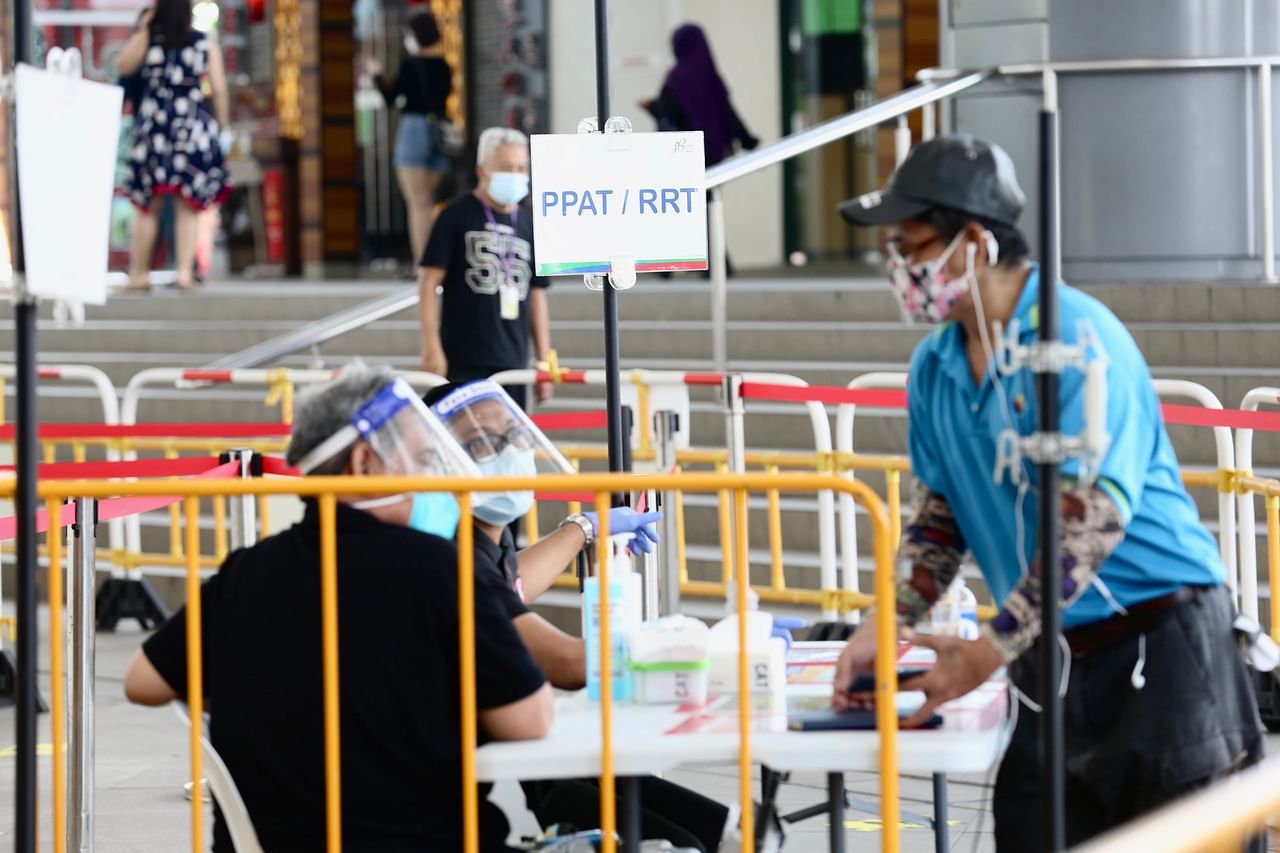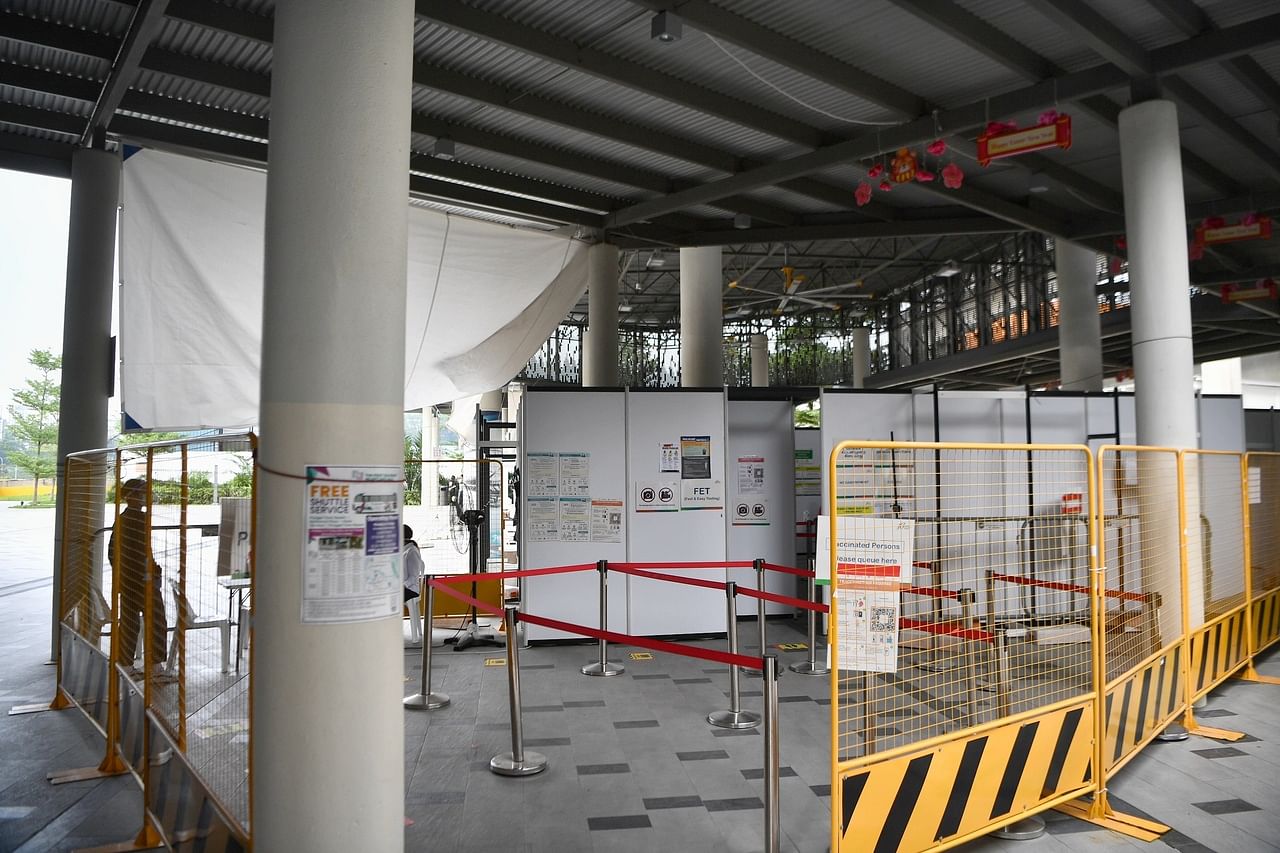SINGAPORE - About 3,500 people took free supervised self-administered antigen rapid tests (ARTs) at Quick Test Centres (QTCs) and Combined Test Centres (CTCs) on Wednesday (Feb 16), the first day of a new scheme that aims to ease the load on general practitioner (GP) clinics and polyclinics.
The Ministry of Health (MOH) had announced on Tuesday (Feb 15) that from Feb 16 to March 15, Covid-19 patients with mild or no symptoms can visit a test centre to take a supervised self-administered ART for free, and get their results reflected in their HealthHub record.
On Thursday (Feb 17), MOH told The Straits Times that the tests are available to anyone aged three and above, although children aged three to 12 must be accompanied by a caregiver who is 21 years or older.
This caregiver may have to help administer the test if the child is unable to do so.
People at test centres that ST visited on Wednesday cited a variety of reasons for going there, including job requirements, shorter queues, the free tests, and getting their results officially recorded.
Migrant domestic worker Joy Ros, 27, got swabbed at a test centre at the former Da Qiao Primary School in Ang Mo Kio after she developed a cough.
"My boss told me to test here because it's free," she said.
Housewife Wong Hooi Fen, 42, said her daughter had tested positive in an earlier ART test but negative at a polyclinic, so she had taken her to the centre to confirm the results.
"If she tests positive, it will be reported to the Ministry of Health and they will inform those who were in close contact with her," she said.
Housewife Jennifer Kwan, 70, got tested at a centre at 321 Clementi Avenue 5 after testing positive on a self-administered ART at home earlier that day.
"Here, we don't have to wait so long, compared to at the GP. The staff are nice and patient," she said.
Saleswoman Serene Luo, 32, did not have a positive test before coming, but said she wanted to get tested for the assurance, and to get her result officially certified.
"I read online that we should not flood clinics, so I decided to do my test at a test centre," she said.

Adjunct Associate Professor Tan Tze Lee, president of the College of Family Physicians Singapore (CFPS), said the general feedback from doctors to this has been positive, and that CFPS was supportive of MOH's move.
He noted that since the start of the Chinese New Year period, there has been an increase in patients with acute respiratory illness at clinics here.
"The surge was particularly significant over the past few days and this has resulted in increased waiting time for patients in clinics," he said, adding that the majority of Covid-19 patients seen at clinics thus far have mild symptoms or are in the low-risk category.
"The diversion of low-risk and asymptomatic or mildly symptomatic patients to QTCs and CTCs will alleviate unnecessary burden on front-line healthcare workers across the various settings, including private clinics, polyclinics and emergency care. This will enable the clinics to better provide medical care to the patients in need of medical care," said Prof Tan.
He added that CFPS hopes employers, schools and various settings will support the new initiative and recognise the positive ART results in lieu of medical certificates (MCs).
Dr Dale Lim, a family physician at Tenteram Clinic in Whampoa, agreed that the new scheme will help reduce the current workload at clinics and allow staff to attend to those who have more severe symptoms or are unable to safely care for themselves.
But despite seeing a 15 per cent increase in patients following the recent surge in Covid-19 cases, he said he has yet to divert any patients to the test centres, as most patients who come to his clinic have symptoms that are significant enough to warrant a medical assessment.
In addition, he said, it would not be advisable to redirect patients who have already shown up at his clinic to the test centres, as they typically need his help to allay their concerns, as well as get advice on how to minimise spread in their homes.
Diverting such patients would also result in them having to travel even farther to the test centres - sometimes via public transport - instead of simply swabbing them and quickly sending them home to isolate, added Dr Lim.
Family physician Quah Soon Wee from Crossroads Family Clinic in Tampines said he generally will not send Covid-19 patients with symptoms to another centre as his clinic is a Public Health Preparedness Clinic, and he swabs children and infants as well.
He said: "A majority of my Covid-19 patients have symptoms. They need medication and they need MC to rest. So I think it is reasonable for these patients to seek treatment at a GP and I will attend to them.
"Some are also confused by the different protocols, and it is our role as GPs to help them navigate the different protocols and allay their anxiety during this pandemic."
But he noted that there are a small number of patients who visit his clinic while asymptomatic, following a positive self-administered ART.
In the past, Dr Quah's clinic staff would have told them to return home and follow Protocol 2, as there is no need for them to see a doctor. Protocol 2 involves isolating at home for the first 72 hours after testing positive, taking an ART afterwards, and ending isolation after getting a negative result.
"Now, my staff will divert them to QTCs or CTCs instead if they want to confirm their ART results," said Dr Quah.

Dr Leong Choon Kit, a family physician at Mission Medical Clinic in Serangoon, said that in general, GPs may find it hard to divert patients away because of the bonds they have formed over the years.
"People usually stick to their GPs whom they know and trust for years... these are my regular patients with whom we have a very strong doctor-patient relationship. They trust us and it is hard for us not to reciprocate. We are here for them in good times and in bad times," he said.
Dr Leong said it is important to tackle other issues which lead to the high volume of patients at clinics.
"Many companies and schools are still asking for (medical) certifications from their employees and students. That is creating a lot of mess and confusion out there. The authorities need to make sure these entities follow the official rules and guidelines... (we) need to solve the root cause," he added.

